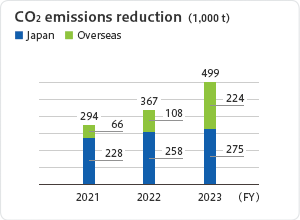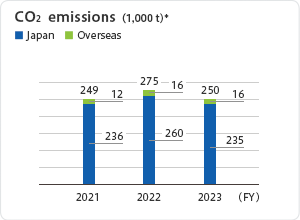The graph shows the performance of CO2 emissions reduction at customers’ plants and business sites through proposals of the Kurita Group. These mainly represent reduction in fuel use by maintaining or improving heat efficiency in boiler and cooling water facilities. It also represents the impact of adopting inverters for rotating equipment in water treatment facilities.
The Kurita Group Approach
The Kurita Group recognizes abnormal weather and natural disasters due to global warming and other climate change issues as a major social challenge to be addressed globally. One of the ways we are responding to climate change is taking steps to reduce our CO2 emissions by reducing our in-house per-unit energy consumption. At the same time, we are working to optimize energy use at our customers’ plants and business sites, and to promote the spread of energy-creating technologies.
Contribution to Achieving the SDGs
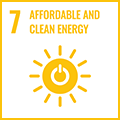
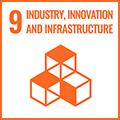
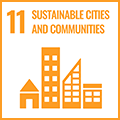
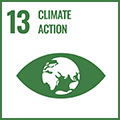
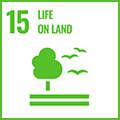
Targets and Achievements
The Kurita Group aims to achieve a reduction of environmental impact through its business that offsets and even exceeds the environmental impact generated by its business. To this end, we have set targets for the “CO2 emissions reduction at customers – CO2 emissions from our business activities.” We will continue to measure these actual values going forward.
| Target for FY2023 | Achievement in FY2023 | |
|---|---|---|
|
CO2 emissions reduction at customers*1 – CO2 emissions from our business activities*2 |
10,000 t | 249,000 t |
- *1 Please refer to the link below for the details of “CO2 emissions reduction at customers.”
Environmental Improvement of Customer's Operations
- *2 “CO2 emissions from our business activities” includes emissions generated from ultrapure water supply business which applies to Category 13 of Scope 3 adding to the Scope 1 and 2 stipulated in GHG (Greenhouse Gas) protocol.
To carry out initiatives in line with the Paris Agreement, the Kurita group has set the long-term targets aligned with the well below 2℃ indicated by SBTi*3, starting from the fiscal year ended March 31, 2020 as the baseline year, and are working to reduce Scope 1, 2, and Scope 3 emissions in addition to the above-mentioned targets.
Initiatives to Address Climate Change
| Metrics | Long-Term Targets | |
|---|---|---|
| FY2031 | FY2051 | |
|
Scope 1 and 2 emissions reduction (Reduction rate from FY2020) |
27.5% | 100% |
|
Scope 3 emissions reduction (Reduction rate from FY2020) |
27.5% | - |
- *3 An initiative that encourages companies to set greenhouse gas emission reduction targets in line with scientific knowledge, with the goal of limiting global average temperature rises due to climate change to well-below 2℃ compared to pre-industrial levels.
With Customers
Reducing CO2 Emissions at Customers’ Plants and Business Sites
Environmental Improvement of
Customers’ Operations
Customer Example
Cardboard Manufacturing Plant: Environmental Improvement Case Study
(Project by Kurita Kitakantou Co., Ltd.)
Corrugator units for manufacturing cardboard sheet are generally used at plants
that manufacture cardboard products. These units press carboard feedstock paper
between metal rollers to produce a corrugated core, then adhere front and back
liner sheets onto the core surface. To firmly fix the core to the liners with
adhesive, it is heated by passing steam through the inside of the rollers. The
challenge for reducing CO2 emissions at cardboard manufacturing is
therefore to reduce the amount of fuel used in the boilers that supply the
steam.
Kurita Kitakantou Co., Ltd. proposed to its cardboard manufacturing
plant customer the application of a technology to improve the thermal
conductivity of the rollers by making the interior metal surface water
repellent. When the steam condenses on the metal surface upon contacting it, a
water film forms. Despite being very thin, this film can significantly reduce
thermal conductivity, which causes more energy to be needed for stabilizing the
heating temperature. The technology proposed by Kurita Kitakantou removes this
water film. Applying this technology helped the customer to reduce their boiler
fuel consumption by around 6%, and by applying the same technology at other
plants, further fuel savings were achieved.
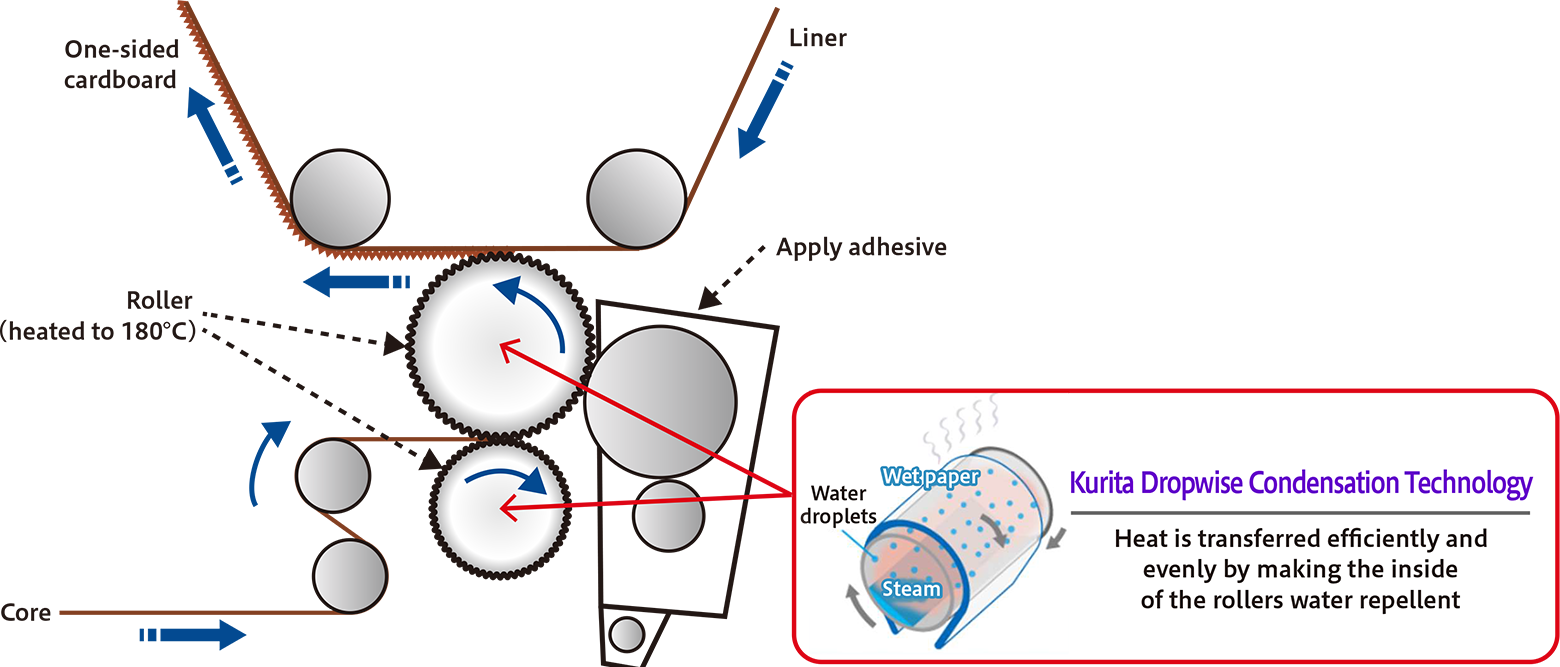
Process for adhering core and liners in a corrugator
This website uses the names of products and services in Japan. Please note that product and service names differ in other countries.
Internal Environmental Improvement Activities
Reducing Energy Usage within the Kurita Group
Internal Promotion of Environmental
Improvements
Based on the characteristics of each company and business site, the Kurita Group selects the items that are strongly correlated energy usage, such as production volume, net sales, or site area, as the denominators for a per-unit measurement, then set about 1% reduction of energy usage per unit year on year.
Kurita Group KPI: Customer Impact Reduction – Kurita Group Impact
Promotion of EVs and Renewable Energy Transition
In fiscal 2023, the Kurita Group took steps to reduce in-house energy usage, such as switching its vehicle fleet from gasoline to electric vehicles and promoting a transition to renewable energy at bases that have a high volume of CO2 emissions from electric power use. These resulted in a 9% decrease in CO2 emissions from the previous fiscal year. In addition, the Group’s R&D base, Kurita Innovation Hub, which started operations in fiscal 2023 also uses 100% renewable energy.
The Kurita Group Accelerates the Actions on Climate Change Based on TCFD Recommendations*
The Kurita Group views climate change as an urgent issue that needs to be
addressed globally, and continuously reduce greenhouse gases generated by our
business activities and contribute to reducing greenhouse gas emissions for our
customers through our business. In order to realize the Kurita Group’s sustainable
growth going forward, we analyzed the risks and opportunities of climate change
and its impact on our business strategies at E&S (Environmental and Social)
Committee, and set medium- to long-term targets and measures for the reduction of
greenhouse gas emissions based on the TCFD Recommendations.
In addition, we
established a system which the Board of Directors oversees the actions on climate
change issues. Please refer to “The Kurita Group’s Initiatives Addressing Climate
Change” in detail.
-
* Final Report: Recommendations of the Task Force on Climate-related Financial
Disclosures (TCFD) (June 2017)
Please refer to the link for the latest information for fiscal 2024 onward.
Participation in METI’s GX League
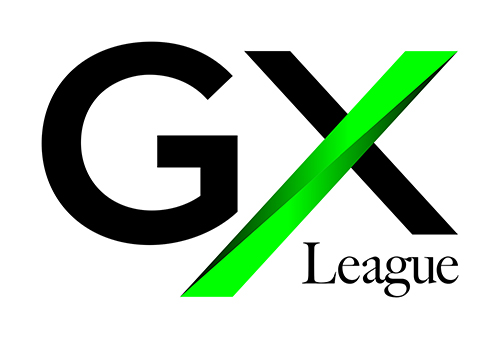
The Company participates in the GX League. The GX League was organized by
Japan’s Ministry of Economy, Trade and Industry (METI) to realize the
Japanese government’s target of “carbon neutral by 2050.” Specifically, the
GX League will provides a forum for discussion on transformation of the
socioeconomic system through collaboration between companies actively
engaging in GX* and entities in government, academia, and
finance, as well as practical implementation for the creation of new
markets.
Based on the Recommendations of the Task Force on
Climate-related Financial Disclosures (TCFD), the Kurita Group continues to
work to reduce GHG emissions generated by its own business activities, as
well as to reduce GHG emissions for customers through its businesses. We are
committed to helping to realize a decarbonized society through participation
in the GX League.
-
* Green transformation
Click here for details on the GX League.
Participation in the Japan Business Federations' Challenge Zero program

Kurita is taking part in Challenge Zero, an initiative run by Keidanren (Japan Business Federation) to develop innovative net zero greenhouse gas emission technologies. As of August 2023, 195 companies and groups had signed up to the initiative, aiming to rapidly achieve the net zero greenhouse gas emissions targets in the Paris Agreement.
Participation in the Japan Society of Industrial Machinery Manufacturers’ Basic Environmental Action Plan
Kurita Water Industries participates in the basic environmental action plan of the Japan Society of Industrial Machinery Manufacturers, which is working on countermeasures for global warming. We report regularly on the status of our response to climate change.


